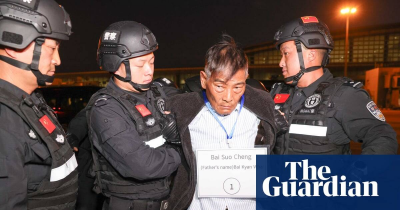The Guardian-Myanmar hands over junta-backed warlords to China in telecoms scam case
January 31, 2024 2 min 412 words
这篇报道揭示了中缅之间在打击电信诈骗方面的合作。缅甸将十名嫌疑人,包括战争贵族白索成,引渡给中国,指控他们在电信欺诈中扮演关键角色。这些中缅电信诈骗中心在疫情期间蓬勃发展,危害中国及其他国家。文章提到,自2021年缅甸政变以来,军政府的掌控导致武装团体和犯罪团伙在国内某些地区执掌权力。缅甸政府一直未能有效打击这些欺诈中心,使得中方敦促尼比多采取行动。然而,军政府的支持却令中缅关系紧张。报道暗示了缅甸政局动荡对地区安全和打击犯罪的影响。这是一场合作的胜利,但也突显了地区内复杂的地缘政治格局。
Myanmar has extradited 10 people, including notorious warlords, to China, where they are wanted for their alleged role in running abusive online and telephone fraud centres in which tens of thousands of foreign nationals are trapped and forced to run scams.
The centres – which target people in China as well as in other countries - have flourished since the Covid-19 pandemic and China says about 44,000 people have been involved, including victims of human trafficking.
The Chinese embassy in Myanmar on Tuesday named six of the people who had been handed over to China’s ministry of public security from the Kokang self-administered zone. They included Bai Suocheng, a Chinese warlord who heads one of the four families who have effectively ruled the area in north-east Myanmar for several years.
Chinese authorities in December issued warrants and bounties, which ranged from 100,000 yuan (£11,108) to 500,000 yuan, for the capture of Bai and nine other key figures accused of being involved in the scam centres.
A military coup in 2021 in Myanmar toppled the government and started a civil war that has enabled armed groups and criminal gangs to take control over parts of the country. The 44,000 people thought to have been involved in the scam centres include thousands who have been trafficked, as well as nearly 3,000 fugitives who are wanted in China.
Beijing has long pressed Naypyidaw to crack down on the scam centres but to little effect. Gen Min Aung Hlaing, Myanmar’s military ruler, has supported the Chinese mafia families, straining relations with Beijing.
In October, an alliance of ethnic rebel groups launched a major offensive, known as Operation 1027, which pledged to root out telecom fraud operators as well as toppling the junta – a commitment that some analysts says was designed to win support from China.
The Chinese embassy’s statement on Tuesday praised the “landmark success in the cooperation of China-Myanmar law enforcement in international police affairs”.
Chinese media published photographs and videos of the suspects on their chartered flight to Kunming, the capital of China’s south-west Yunnan province, where they were escorted on to the asphalt by dozens of Swat officers. The suspects had their hands tied behind their backs and wore large white placards stating their names in English.
Between September and November last year, Myanmar handed over 31,000 telecom fraud suspects to China, according to the Chinese authorities.

